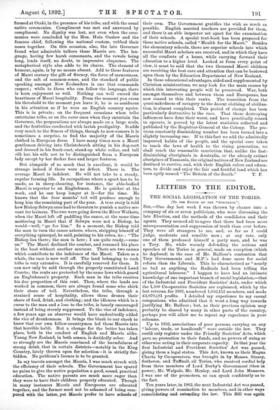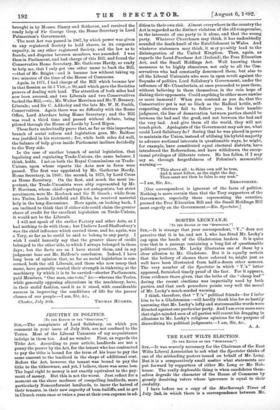LETTERS TO THE EDITOR.
THE SOCIAL LEGISLATION OF THE TORIES.
[To THE EDITOR OF TRH "SPECTATOR."]
SIE,,--One day last week I was thrown by chance into a company of six or seven politicians, who were discussing the late Election, and the methods of the candidates and their agents. They seemed all to agree that there had been more misrepresentation and suppression of truth than ever before. They were all strangers to me, and, so far as I could judge, moderate and sensible men ; at any rate, only one of them professed himself a party man, and be was a Tory. He, while warmly defending the actions and speeches of the Tories in general, made an exeeption (which he deplored) in the case of Mr. Balfour's contention that Tory Governments and M.P.' s had done more for social reform than the Liberals. This he characterised as "nearly as bad as anything the Radicals had been telling the agricultural labourer." I happen to have had an intimate knowledge of one important branch of social legislation,—that of the Industrial and Provident Societies' Acts, under which the 1,500 Co-operative Societies are registered, which by the last returns, for 1891, numbered 1,056,152 members, and made £4,070,281 profits. I detailed my experience to my casual companions, who admitted that it went a long way towards justifying Mr. Balfour ; but, as their previous opinion may probably be shared by many in other parts of the country, perhaps you will allow me to repeat my experience in your columns.
Up to 1852, associations of poor persons carrying on any "labour, trade, or handicraft" were outside the law. They could only register under the Friendly Societies' Acts, which gave no protection to their funds, and no powers of suing or otherwise acting in their corporate capacity. In that year the first Industrial and Provident Societies' Act was passed, giving them a legal status. This Act, known as their Magna Marta by Co-operators, was brought in by Messrs. Slaney, Sotheron, and Tuffnall, all Tories, who received cordial help from three members of Lord Derby's Government (then in power), Mr. Walpole, Mr.- Henley, and Lord John Manners. I was one of the promoters, so can speak confidently as to the fact.
Ten years later, in 1862, the next Industrial Act was passed, giving powers of nomination to members, and in other ways consolidating and extending the law. This Bill was again
brought in by Messrs. Slane,' and Sotheron, and received the ready help of Sir George Grey, the Home Secretary in Lord Palmerston's Government.
The next Act was passed in 1867, by which power was given to any registered Society to hold shares, in its corporate capacity, in any other registered Society, and the law as to frauds, and disputes between members, was amended. I was then in Parliament, and had charge of this Bill, and found the Conservative Home Secretary, Mr. Grathorne Hardy, so ready to help me, that I only got one other name to back the Bill, —that of Mr. Bright—and it became law without taking up two minutes of the time of the House of Commons.
Again, in 1871, I had charge of the Bill which became law in that Session as 34-5 Viet., c. 80, and which gave the Societies powers of dealing with land. The attention of both sides had now been aroused, and two Liberals and two Conservatives backed the Bill,—viz., Mr. Walter Morrison and Mr. T. Brassey, Liberals ; and Sir C. Adderley and the late Mr. W. H. Smith, Conservatives. Again there was no difficulty with the Home Office, Lord Aberdare being Home Secretary ; and the Bill was read a third time and passed without debate, being piloted through the House of Lords by Lord Ripon.
• These facts undoubtedly prove that, so far as this important branch of social reform and legislation goes, Mr. Balfour was justified in his statement ; for, while both sides did well, the balance of help given inside Parliament inclines decidedly to the Tory side.
In the case of another branch of social legislation, that legalising and regulating Trade-Unions, the same balance, I think, holds. I sat on both the Royal Commissions on Trade- Unions, upon whose reports the Acts now in force were passed. The first was appointed by Mr. G-a,thorne Hardy, Home Secretary, in 1868; the second, in 1875, by Lord Cross as Home Secretary. On the first, and much the most im- portant, the Trade-Unionists were ably represented by Mr. F. Harrison, whose chief—perhaps not antagonists, but strict scrutineers, were Mr. Roebuck and Sir D. Gooch ; while from two Tories, Lords Lichfield and Elcho, he received material help in the long discussions. Here again, on looking back, I am inclined to think that if either side could claim the greater share of credit for the excellent legislation on Trade-Unions, it would not be the Liberals.
I will not speak of the earlier Factory and other Acts, as I had nothing to do with them ; but I believe Lord Shaftesbury's was the chief influence which carried them, and he, again, was a Tory, so far as he could be said to belong to any party. I wish I could honestly say that the greater share of credit belonged to the other side, to which I always belonged in those days ; but the facts are as I have stated them, and in my judgment bear out Mr. Balfour's conclusion. Indeed, I have long been of opinion that, so far as social legislation is con- cerned, both the old Liberals, and those who now usurp that name, have generally wasted their strength in tinkering at the machinery by which it is to be carried—shorter Parliaments, paid Members, "One man, one vote," &c.—whereas the Tories, while generally opposing alterations in the machinery, have, in their stolid fashion, used it as it stood, with considerable success in improving the conditions of life for the poorer classes of our people.—I am, Sir, Sze, Chester, July 30th. TH031..1/48 HUGHES.



































 Previous page
Previous page